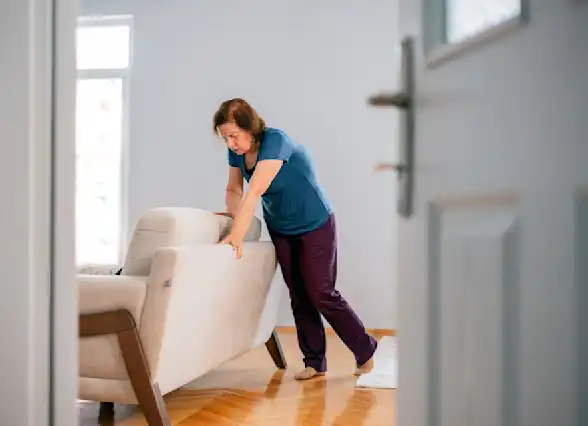Hearing Problems and Increased Fall Risk
It may be surprising to learn that your loved one's hearing and inner workings of their ears can contribute to falls.
Get insurance benefits, legal documents, and medical records in one place

Helpful Highlights
Hearing provides valuable clues to our environment that contribute to safety.
Even a mild degree of hearing loss triples the risk of an accidental fall. And this risk increases by 140 percent for every additional 10 decibels of hearing loss.
The vestibular system maintains our balance and sends information to the brain about body position.
Disruptions in either hearing or the vestibular system can contribute to injury and falls.
Hearing loss
Our ability to hear provides us clues about the world around us, as we receive signals of our location, a sense of direction, and even indications of danger from what we hear. Difficulty hearing may not directly contribute to fall risk, although not being able to hear certain tones, sounds, or voices can increase your loved one's risk for harm or injury. For example, while driving or mowing, or while on foot in places like intersections, crowded venues, or during outdoor activities.
Hearing loss occurs because of damage or defects to the conductive parts of the ear (outer and middle) or the sensorineural parts of the ear (inner).
In the case of conductive hearing loss, the three leading causes are wax build-up, ear infection(s), and otosclerosis. Otosclerosis is the inability to amplify sounds because one of the three tiny bones in the ear (ossicles) is unable to vibrate freely.
In the case of sensorineural hearing loss, the three leading causes are inherited disorders (family history), noise exposure, and presbycusis (most common). Presbycusis is simply age-related hearing loss that occurs for many of us as we grow old.
How the ears contribute to falls
Even a mild degree of hearing loss triples the risk of an accidental fall. And this risk increases by 140 percent for every additional 10 decibels of hearing loss.
Dizziness and vertigo can occur while lying down or while standing. If it occurs while standing, it can - and often does - contribute to falling. And because the vestibular system is compromised, often we cannot react fast enough to prevent the fall.
Deep inside the ear is the vestibular system. The vestibular system is a delicate network of fluid-filled canals whose primary purpose is not just to aid in hearing but to provide our sense of balance by constantly sending information to the brain about our body position. This allows for rapid, reactive body movements (called compensatory movements). Some are so small as to go undetected, such as while casually walking, and others are quite large, such as when we outstretch our arms when we fall. Physicians who specialize in this area consider the vestibular system the sixth sense because it functions at an almost unconscious level.
When the vestibular system is clogged, inflamed, swollen, or damaged, it can affect our balance and compensatory movements. Dizziness and vertigo - the feeling of spinning even when we're not moving - are vestibular balance disorders that can strike at any age, though are most common as we get older.
Vertigo strikes with changes in head position, and those changes that are unique to the person who has it. For some, it can happen while turning their head side to side. For others, it can be looking up and to the right. For others still, it can be tilting the head back. And for some, it just seems to come and go without any particular head movement.
Hearing exams test for more than hearing
Hearing loss alone is reason enough to encourage your loved one to get a yearly hearing exam, though perhaps more importantly, hearing exams can also detect these vestibular system disorders. Both hearing health and vestibular health are essential for your loved one's safety and well-being because, in addition to safety, they can contribute to anxiety and depression, and impact socialization.
Early detection of problems gives your loved one and their healthcare team a better chance to address them and either reduce their effects or, in some cases, reverse them.
RESOURCES
American Speech-Language-Hearing Association (ASHA)
UT Southwestern Medical Center
Lin, F.R., & Ferrucci, L. (2012). Hearing loss and falls among older adults in the United States. JAMA: Archives of Internal Medicine, 172(4), 369-371. doi: 10.1001/archinternmed.2011.728
Wells, T.S., Karl, J.L., Bhattarai, G.R., Nickles, L.D., & Yeh, C.S. (2020). Hearing and vision impairment is associated with falls risk among older adults. Journal of Geriatric Medicine and Gerontology, 6(2). DOI
No content in this app, regardless of date, should ever be used as a substitute for direct medical advice from your doctor or other qualified clinician.
Get more support and guidance on insurance benefits, medical records and legal forms.
Helpful brings together your insurance benefits, legal documents, and medical records in one personalized place — so you always know what you have, and never have to search again.

Technology for Health Tasks. Mental Health for the Tough Stuff.
Helpful connects your medical records, insurance, and caregiving tasks automatically. And when you need more than logistics, a therapist is here to guide you.
In-Network and Covered
For Individuals, Couples and Families
HIPAA Compliant, Data Stays Private


Healthcare Tasks Simplified

From syncing records to spotting drug interactions, Helpful does the heavy lifting, turning complex health info into clear tasks and showing you benefits you can actually use, giving you clarity and control over your care.

In-Network Mental Health

Our licensed therapists are here to support you and your loved ones through stress, burnout, and life’s hardest moments, with an inclusive, compassionate approach that works with most insurance plans.

Create Legal Documents

Plan ahead by creating will, trusts, advance directives and more, that ensure your wishes are honored in the event you can’t speak for yourself -with Helpful guiding you every step of the way.